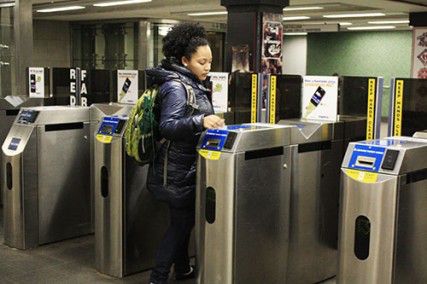
The American Society of Civil Engineers released its 2013 Report Card for America’s Infrastructure Tuesday, giving the U.S. public transportation infrastructure a “D” grade amid Mass. Gov. Deval Patrick’s 21st Century Transportation Plan to give the Massachusetts Bay Transportation Authority $3.3 billion for upgrades.
“Receiving a D grade of a transportation infrastructure shows that we have failed to invest properly, particularly to long-term investment of expansion for public transportation,” said Mantill Williams, director of advocacy communications at the American Public Transportation Association.
The American economy lost $90 billion in 2010 just for the lack of investment in improvements to the U.S. transportation infrastructure, Williams said.
“It is sort of a wake-up call that it is going to be devastating to our economy when we do not invest in our public transportation system, particularly legacy systems such as Boston, New York and D.C., because it does have a direct impact on the global economy,” he said.
Patrick’s plan calls for disbursement of over $13.7 billion to improve transportation infrastructure throughout the Commonwealth.
Williams said the MBTA is one of the oldest public transportation systems in the country and is effective in getting people where they need to go, but because of the lack of long-term investment, maintenance and expansion have been hindered.
“Boston is probably classic in a sense that they have a very mature system, a very expansive system,” he said. “But because of our lack of long-term investment, we’re not able to keep up with the demand.”
MBTA officials expect to operate on improving the system with the investment of Patrick’s plan and to reduce the deficit, said Joe Pesaturo, spokesman for the MBTA.
“We have the oldest subway in America, and because of that, it has a lot of maintenance needs. We have to do a lot of investing in the existing tunnels, the tracks, the signals, the switches and the trains themselves,” Pesaturo said. “We have some subway cars on the Red Line that have been [in operation] since 1869.”
The MBTA has an overall debt of $8.3 billion, making it the highest debt burden for any public transportation system in the U.S.
“We’re hearing very encouraging things from the Speaker of the House [Robert] DeLeo, and Senate President [Therese] Murray,” he said. “We are very optimistic that the legislators are going to take some action this spring that will address the MBTA’s financial issues.”
Mass. Sen. Stephen Brewer, of Barre, said he supports Patrick’s plan and hopes to see significant improvements to the MBTA infrastructure.
“I would like to see cleaner stations, cars that don’t break down, services that will allow people such as those that work at hospitals to be at work at 5 o’clock in the morning, advertising on the T and any efficiency that assures riders are getting the best value for their dollar,” he said.
Some residents of Boston and T riders said they support Patrick’s plan.
“It would be nice if it came with later service if they really want to prevent drunk driving. It would be really nice if it stays open till after the bar is closed,” said Allston resident Matt Durso. “I am all for putting more money into the system.”Alexa Wagner, a graduate student at Boston University, said she would be willing to pay more money to help fix the infrastructure of the MBTA.
“I would probably be okay with tax money getting spent on the MBTA if there’s a way to prove the plan would really work and really fix the problems,” she said. “We need more frequent service, on-time trains, the ability to track trains of where they are and when they are coming and fewer delays.”
Martha Norton, a South End resident, said if Patrick’s plan does not pass, she would support an increase to the MBTA fare.
“It seems to me that it is pretty cheap to go across town for $2.50. If it gets raised to $2.75 or $3, it is still a cheap way to get across town,” she said. “I think we as a population, rather than the city of Boston, would be willing to pay for it.”
This is an account occasionally used by the Daily Free Press editors to post archived posts from previous iterations of the site or otherwise for special circumstance publications. See authorship info on the byline at the top of the page.













